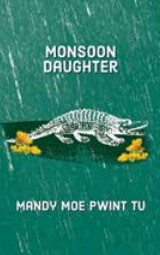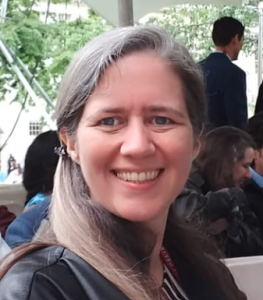
We did not set out to be overtaken by robots.
I’d just returned from my friend’s cluttered Oakland apartment, where I’d been sent home with a promising gadget: a second-hand robotic vacuum, complete with accessories. Its gray plastic glinted newly beneath a layer of dust. “It needs floorspace to roam,” she’d said, wistful. Though less cluttered, my own apartment was far from pristine, our tile floors perpetually gritty with crumbs and dog hair. Maybe Roomba was the miracle I was looking for.
“Zach’s not going to like this,” I said.
“Oh, he’ll be fine.” I hoped she was right.
“Won’t they sell our floorplan to the government or something?” My husband, while hardly a technophobe, was raised by a conspiracy theorist. My reassurances that we were too boring to monitor did little to assuage him.
“It’s not even Wi-Fi compatible. Think of it as a naked Furby.”
“Fine, but what if it gets the dog?”
“It has sensors! If it bumps into him it’ll back right up. No harm, no foul.”
“Okay, but what if we trip over it and die in the night?”
“It has a charging dock and knows how to find its way back!” He looked mortified. “No, no that’s a good thing; otherwise we’d be losing it constantly.”
“Why can’t we just sweep the house?”
“I mean, we can. But I won’t.” He nodded, defeated. “And if we hate it, we can give it back.”
“I’ll give it a week,” he conceded.
That night, we were startled awake by an ominous WHIRRRRR in the living room.
“Do you hear that?!” I whispered.
“Holy shit someone’s in the house.”
“It sounds mechanical, like the washer is overflowing or—” I sat up, struck by a sudden realization. “ROOMBA.”
“ROOMBA?” said Zach, propping himself up on his elbows.
“I guess they had it on a timer or something!”
“Oh, for chrissake,” said Zach. The whirring continued, interrupted periodically by the sound of it gently clunking into and reversing out of corners.
“Well, whatever,” I said, catching my breath. “It’ll just tire itself out and go home.” He rested his head on my shoulder and closed his eyes.
But the whirring only got louder, closer. WHIRRRRR. CLUNK. WHIRRRRRR. CLUNK. Roomba slowly careened down the hallway toward our bedroom, navigating the alien terrain of our railroad-style apartment. It knocked against our door, which immediately swung open.
“It hungers,” I said. We stared at each other in the dim ambient light. Roomba made a beeline for the bed, our eyes widening with horror as it barreled forth.
“So, this is it,” he said. “This is how we die.”
I clung to him as Roomba slipped under the bed and began feasting on our prized collection of dust bunnies. After gorging itself on cast-off skin cells and loose dog hair, Roomba steered back toward the door.
“I guess it’s done,” I said, prematurely. Roomba scooted around the back of the door, slamming it shut and trapping all three of us, four if you count the dog snoring undisturbed at our feet, in the bedroom.
“Goddamnit,” said Zach.
We did not die that night. Or the next. With time, we grew accustomed to our electric boarder. Roomba was, overall, self-sufficient, but was clearly no threat to our survival. We’d find it desperately humping the threshold between the hallway’s tile and the bedroom’s faux wood for minutes on end, eventually passing out mid-coitus and establishing itself as a tripping hazard. “Please. Charge. Roomba,” it pleaded.
When its external sensors, little plastic lighthouses we set up to keep it from wandering into the laundry room, ran out of batteries, I inevitably failed to replace them. They hadn’t really worked anyway. We wandered around trying to find our automated son, only to (literally) stumble across it gagging on a fallen sock. “Move. Roomba. To a new. Location. Then press ‘Clean.’ To restart,” it demanded. A quick tug freed the offending sock from its rollers, but by the end of the day, Roomba would be back in the forbidden room slurping up fallen garments or a Truman Capote postcard. Periodically, we’d notice that the spinning trio of bristles had ceased to twirl, which meant Roomba had been just running back and forth across the apartment for days without sweeping anything new into its robo-maw. Still—after cutting loose the clump of hair tangling its mechanisms, it whirred back to life, resilient and hungry as ever.
The floors got cleaner. I tracked fewer crumbs into bed. Zach had not only accepted our new Jetson-ian lifestyle, but he begrudgingly began to enjoy it. We moved to Philadelphia and Roomba was assigned its own box. When we got the keys to our new house, a row home trashed by its former residents and a story of its own, Roomba helped us deal with the cat hair, pizza residue, and rodent excrement. When we adopted our second dog, a gleeful, but clumsy pit-mix, Roomba helped us manage the uptick in shedding. Frank the pit, taking Charlie the chihuahua’s cue, quickly learned to ignore our roving roommate, apathetic as it bounced off his sleeping form on its daily commute around the first floor. Roomba rebounded from its past love and developed a new relationship with a wooden threshold, collapsing in the liminal space between the entryway and living room when its sensors gave up on dislodging the permanent fixture. All was well.
I was in my cubicle when my phone buzzed. It was Zach.
“Hey, babe, what’s up?” I asked, expecting one of his midday reports about drama at work or a confusing bill we’d received, or a shift in plans for the evening.
“Hey, so,” he said, his voice simultaneously nervous and tired, “have you ever seen that meme about Roomba and the dog—”
I had seen the meme. In it, a blurry cell phone photo reveals the shit-encrusted underbelly of a robot vacuum, accompanied by a hand-drawn chart of the brown, zig-zagging path it’d taken throughout their home.
“No…” I implored. “… It didn’t.”
“Oh, it most certainly did.”
Frank, bless his heart, was still adjusting to living indoors. We mostly got to his accidents quickly, scooping the offending pile into a grocery bag and spraying down the site with enzymatic cleaners to eliminate any lingering odor. But the night before, Frank had walked downstairs on his own after we’d fallen asleep, only to find a closed door. With no yard in sight, he did what had to be done, in the kitchen. Roomba, on its never-ending quest, tried to help, but the load proved too much for its meager jaws. The turd was half-ingested, gunking up the brushes and rollers and distributing itself evenly across the house, a foul stowaway on the S.S. Roomba.
Kindly, Zach dealt with the most urgent sites, scraping and mopping the floors and airing out the stench. Roomba was set on the porch for a timeout, a child waiting for its father to come home and deliver on its mother’s threats. We debated throwing it out entirely, but something inside me refused. Perhaps it was the intergenerational trauma of my grandmother’s depression-era childhood, or maybe it was my own unique neuroses, but it felt both wasteful and cruel to dispense of our pet vacuum in its time of need. YouTube University came to the rescue with a video aptly titled “How to clean poop out of your Roomba.” The support was twofold: a friendly woman named Victoria taught me how to disassemble the device while wearing dish gloves, and 108 commenters below reassured me that I wasn’t the first or last person to encounter this dilemma.
Approximately one hour, 47 Q-tips, and a ruined toothbrush later, Roomba had been purified and was recovering on its charger. Roomba lived out the remainder of its days in relative peace, following us to a suburban rental where it had more room than ever to roam, freely gobbling up dog hair and the occasional tidy mouse dropping. Eventually, its bristled propellers stopped working entirely, and I was faced with a decision: to replace the parts and hope it would start functioning again, or to surrender and stop pouring time and money into a near-decade-old model. I packed Roomba, its charger, and its useless external sensors into a box and placed it at the end of our driveway. It was gone by the end of the day, hopefully taken in by some good-hearted tinkerer.
Roomba’s absence was painfully obvious. Within days, we were overwhelmed by dirt and dander. I’d wake up every morning congested and allergic. The afternoon light pouring through our windows illuminated every particle of filth on our floorboards. We swept constantly, or at least, as often as we could, but it was no use. Even at its most decrepit, Roomba had been the one thing standing between our livable home and total chaos.
In February, I caved and bought a refurbished Eufy RoboVac 25C for $90 on eBay. It’s Wi-Fi compatible, which worried Zach, but I promised to never connect it to our network, lest it sell our floorplan to Amazon for some unknown nefarious purpose. Without connecting it to the app, the only way to control the device is with an external remote, which has a plethora of fun buttons and allows you to drive it like a toy car, albeit an extremely slow one. It gets stuck under our couch and beneath our radiator covers, it chokes on the occasional piece of string, and it has an incurable urge to hump the metal edging that lines the linoleum portion of our kitchen, which I find nostalgic. Despite its flaws, our floors are cleaner than ever. As we say at Passover each year, “dayenu,” which means “it would have been enough.”
I know its name is Eufy Robovac, but I’ve been calling it Roomba as a sentimental tribute to the fallen. Unlike its predecessor, it cannot speak, emitting simple beeps in a sequence decoded in the handbook I haven’t read. It’s the only member of my family that never answers when I call its name—Dayenu.
Julian Shendelman lives with his husband and two dogs near Philadelphia. After pursuing—and ultimately abandoning—an academic career as a queer/trans theorist, Julian turned his attention to re-establishing his writing practice and community. His poetry chapbook, “Dead Dad Club,” was published by Nomadic Press in 2017 and his creative nonfiction has appeared in Bat City Review. He’s been a fellow at the Lambda Lit Retreat for Emerging LGBTQ+ Writers (2012) and the Virginia Center for the Creative Arts (2022). When he’s not freelancing, he’s running Collective Lit.






